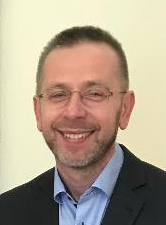Spotlight on legal tech freelancing – Q&A with Zbyszek Konieczny
Freelancing has taken over as a powerful alternative within law firms and is quickly shaping the future of work with more legal support professionals going solo.
Meet Zbyszek Konieczny, former Information Systems Manager at Weil, Gotshal & Manges, now a LEXITUP freelancer.

LEXITUP: What areas of technology did you oversee during your 25 years at Weil, Gotshal & Manges?
Z.K.: As an IT professional in a top global law firm with a Europe & Asia remit, I had responsibility encompassing IT Strategy, Management, Business Process Improvement, IT Operations, and Service Delivery.
LEXITUP: As a freelancer at LEXITUP, what type of IT/Tech Consulting, Security & Compliance solutions for the legal industry are you offering to law firms?
Z.K.: I help law firms manage their IT and reduce their day-to-day administrative tasks so they can focus on growing their business.
From help desk support to custom software solutions, I provide the expertise and direction to meet your business goals. For example, if a law firm does not have a professional Document Management System or wishes to replace an underperforming one, I have many years of experience in implementing iManage Desksite. It is a state-of-the-art Document Management System that is used throughout top law firms and that will satisfy the most demanding ones.
I can offer to come onsite and conduct an IT audit. This can be an IT department audit, a thorough software/hardware audit, IT Security audit, or one that can help introduce IT innovation and cost savings. I can be engaged on a project basis or for an hour, a day or a week.
LEXITUP: Tell us about the IT talent shortages across Europe in the legal industry.
Z.K.: It has been an ongoing challenge to find reliable IT employees for a number of years, especially ones that can embrace an international law firm’s culture, have the right soft skills and speak English well. I’ve helped a few firms source and assess IT professionals, cognizant that Partners and IT Managers usually like to have lean departments and keep the attorney/IT ratio as favorable as possible. IT freelancers can help with that, providing professional assistance with a spectrum of specific IT needs and engaged only a project basis.
LEXITUP: What trends are you seeing in Warsaw with respect to technology fostering remote work & mixed work force?
Z.K.: The COVID-19 pandemic has been a true test of remote work technology. In most cases, law firms which have invested in modern state-of-the-art solutions, adapted brilliantly. Attorneys were able to seamlessly provide legal advice from their home office. IT departments proved they could provide the same quality of support as previously delivered in the office.
The biggest trend in CEE will pertain to further expansion of freelancing across the legal industry. This is due to tech advancement, embrace of home office, the shift in mentality, and the newly discovered opportunities this provides. Forced home office due to the pandemic persuaded even the most resistant business leaders to experience that “this can work”! Several Partners in Warsaw told me they closed large and complex deals all remotely. They used modern technology ranging from easy group video calls, document co-authoring to electronic signatures all while being (occasionally) in their pajamas.
Both lawyers and support professionals at Polish law firms in Poland claim they were the most effective when working from home 1 – 2 days a week. Their time in the office was for innovative and collaborative work and meetings and home was reserved for focused work. With digital transformation taking place at law firms compounded by the preferences of the next generation, it is clear that future firm life will be split between home and office with freelancers in the mix.
LEXITUP: The trend is that law firms launch more and more applications, software, databases and platforms for their clients and potential clients. Do you advise legal teams on how to automate certain processes and produce such applications?
Z.K.: Yes, of course. GCs are very interested in legal technologies but are not sure where to best allocate their efforts and investment. I work as an integral member of the team alongside the in-house counsel and the law firm advising them to consider what a new tech enhanced model would look like. Likewise, I help the law firm re-evaluate how they can deliver their advice to their client. Until recently, law firms in CEE were unaware of the needs of their clients when it came to technology. Increasingly even the most traditional firms recognize they have to change with the times.